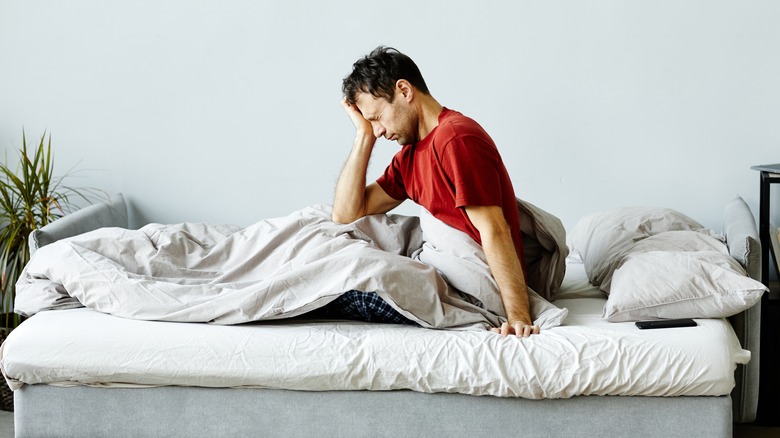This Is The Best Sleep Position To Protect Your Brain
Your brain does a lot of work for you during an average day. It generates memories, emotions, and up to around 60,000 thoughts. Your brain regulates your hunger, heartbeat, breathing, and body temperature. Even when you sleep, your brain keeps working for you in forming memories from your day's events, improving its ability to adapt to new situations, and sustaining your immune function.
A relatively new finding among neuroscience researchers is that the brain also takes out its trash during sleep. According to a 2020 article in Brain Sciences, toxins that accumulate in the brain get filtered out during your slow-wave non-REM sleep, also called the N3 stage of sleep. So, even though we might think of sleep as a time of rest, it's actually when the brain's cleaning system — called the glymphatic system — works the hardest. If you don't get enough sleep, a harmful substance builds up in the brain that can lead to inflammation and cognitive decline. Your sleeping position can also impact how efficiently your brain clears these waste products. If you want to effectively remove these toxins from your brain while you sleep, it's best to sleep on your side.
Your sleep position affects your brain's clearing system
Although people and animals sleep in different positions, a 2015 study in The Journal of Neuroscience looked at how body posture during sleep affects the glymphatic system. Using advanced imaging and modeling techniques on rats under anesthesia, researchers found that the lateral (side) sleeping position is the most efficient for waste removal compared to lying on the back (supine) or stomach (prone). This suggests that the common side sleeping position is the most efficient for glymphatic transport during sleep.
Sleeping on your back for more than two hours a night is more common in people with neurodegenerative diseases such as Parkinson's, Alzheimer's, and other types of dementia, according to a 2019 article in the Journal of Alzheimer's Disease. The researchers suggested that gravity influences how blood moves out of the brain, and the position of the head during sleep may impact how efficiently the brain clears proteins.
A 2022 article in Frontiers in Neuroscience found that people with obstructive sleep apnea could have problems with their glymphatic system. In particular, when people with sleep apnea have periodic episodes of low oxygen during sleep, this could activate the inflammatory response and damage the glymphatic system.
Other factors that affect your brain's clearing system
Your heartbeat and respiratory rate affect your glymphatic system because they drive the flow of the cerebrospinal fluid, according to the 2020 article in Brain Sciences. Your brain experiences larger fluctuations in this flow while you sleep. However, your lung efficiency decreases with age, which results in more shallow breathing that can reduce your glymphatic drainage.
Stress affects your brain's cleaning system and can lead to accumulating harmful substances over time. Chronic stress is involved in the development of Alzheimer's, which is the plaque buildup of these harmful beta-amyloid proteins. Excessive or prolonged alcohol use can reduce glymphatic clearance, but light drinking could increase this activity.
Some types of intermittent fasting can regulate the glymphatic system, and fasting days could increase the brain's drainage of toxic substances. Exercise not only improves your cognitive health, but it also improves glymphatic transport and protects against neurodegeneration. Omega-3 fatty acids found in some types of fish are also beneficial for the brain's clearing system.



